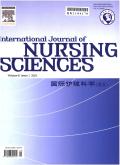中国重庆不同级别医院临床护理人员的老年护理能力:横断面研究
IF 3.1
3区 医学
Q1 NURSING
引用次数: 0
摘要
方法 本研究于 2022 年 12 月 24 日至 2023 年 1 月 7 日在西南地区 204 家医院进行。采用 "临床护士老年护理能力调查工具",通过分层抽样探讨影响老年护理能力的因素。调查通过 "文娟星 "网络平台发放并回收问卷。其中有效问卷 9442 份。临床护理人员的老年护理能力总分为(2.29±0.81)分,二级医院的总分为(2.23±0.78)分,三级医院的总平均分为(2.33±0.83)分。影响二级医院的因素包括科室、护士年龄和总工作年限(P < 0.05)。结论 临床护理人员的老年护理能力受多种因素影响,处于中下水平,且不平衡。研究结果凸显了进一步开展老年护理临床培训的必要性。对老年病科护士的培训应侧重于必要的临床技能,使其做好充分应对老年病综合征的准备。本文章由计算机程序翻译,如有差异,请以英文原文为准。
Geriatric nursing competence of clinical nursing staff at different hospital levels in Chongqing, China: A cross-sectional study
Objectives
This study aimed to survey the geriatric nursing competencies of clinical nursing staff in Chongqing City, China, and provide suggestions to enhance these competencies.
Methods
This study was conducted in 204 hospitals in Southwest China from December 24, 2022 to January 7, 2023. The “Geriatric Nursing Competence of Clinical Nurse Investigation Tool” was used to explore factors that influence geriatric nurses’ competencies via stratified sampling. The survey was conducted by distributing and collecting questionnaires through the online platform Wenjuanxing.
Results
A total of 10,692 nurses answered the questionnaires. Of these questionnaires, 9,442 were valid. The total geriatric nursing competence score of the clinical nursing staff was 2.29 ± 0.81, the secondary hospital score was 2.23 ± 0.78, and the tertiary hospital’s overall mean score was 2.33 ± 0.83. The factors that influenced secondary hospitals included the department of medicine, age of nurses and total length of career (P < 0.05). The factors that influenced tertiary hospitals included the department of medicine, age of nurses, nurses’ professional title, and geriatric practical advanced nurses’ certification (P < 0.05).
Conclusions
Geriatric nursing competence among clinical nursing staff is imbalanced at a lower-middle level and is influenced by various factors. The findings highlight the need for further clinical training in geriatric nursing. The training of geriatric nurses should focus on necessary clinical skills and on preparing them to adequately manage comprehensive geriatric syndromes.
求助全文
通过发布文献求助,成功后即可免费获取论文全文。
去求助
来源期刊

International Journal of Nursing Sciences
Nursing-Nursing (all)
CiteScore
6.10
自引率
2.60%
发文量
408
审稿时长
25 days
期刊介绍:
This journal aims to promote excellence in nursing and health care through the dissemination of the latest, evidence-based, peer-reviewed clinical information and original research, providing an international platform for exchanging knowledge, research findings and nursing practice experience. This journal covers a wide range of nursing topics such as advanced nursing practice, bio-psychosocial issues related to health, cultural perspectives, lifestyle change as a component of health promotion, chronic disease, including end-of-life care, family care giving. IJNSS publishes four issues per year in Jan/Apr/Jul/Oct. IJNSS intended readership includes practicing nurses in all spheres and at all levels who are committed to advancing practice and professional development on the basis of new knowledge and evidence; managers and senior members of the nursing; nurse educators and nursing students etc. IJNSS seeks to enrich insight into clinical need and the implications for nursing intervention and models of service delivery. Contributions are welcomed from other health professions on issues that have a direct impact on nursing practice.
 求助内容:
求助内容: 应助结果提醒方式:
应助结果提醒方式:


